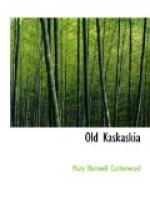The river’s tremendous rolling roar was also swollen to unusual magnitude. He looked afar over a tawny surface at undermined stumps and trees racing past one another. The June rise, which the melting of snows in those vague regions around its head-waters was called, had been considerable, but nothing to terrify the Kaskaskians. One week’s rain and the drainage of the bottom lands could scarcely have raised the river to such a height. “Though Heaven alone can tell,” grumbled the friar, “what the Mississippi will do for its own amusement. All the able slaves in Kaskaskia should be set to work on the levee before this day is an hour older.”
Carrying the hoe on his shoulder like any laborer, and drawing the hood of his garment over his bald crown as the mist of rain increased to a driving sheet, Father Baby tramped along the river edge toward an unfinished defense against the waters. It was a high dike, beginning on a shoulder of the peninsula above the town, but extending barely a mile across a marsh where the river had once continuously raveled the shore even in dry seasons. The friar was glad to discern a number of figures at work carting earth to the most exposed and sunken spots of this dike.
The marsh inside the embankment was now a little lake, and some shouting black boys were paddling about there in a canoe which had probably been made during the leisure enforced by wet weather. It was a rough and clumsy thing, but very strongly put together.
The tavern in Kaskaskia was a common meeting-place. Other guest houses, scattered through the town, fed and lodged the humble in an humble way; but none of them dared to take the name “tavern,” or even to imitate its glories. In pleasant weather, its gallery was filled with men bargaining, or hiring the labor of other men. It was the gathering and distributing point of news, the headquarters of the Assembly when that body was in session,—a little hotel de ville, in fact, where municipal business was transacted.
The wainscoted dining-room, which had a ceiling traversed by oak beams, had been the scene of many a stately banquet. In front of this was the bar-room, thirty by forty feet in dimensions, with a great stone fireplace built at one end. There was a high carved mantel over this, displaying the solid silver candlesticks of the house, and the silver snuffers on their tray embossed with dragons. The bar was at the end of the room opposite the fireplace, and behind it shone the grandest of negro men in white linen, and behind him, tier on tier, an array of flasks and flat bottles nearly reaching the low ceiling. Poor Kaskaskians who entered there, entered society. They always pulled their cappos off their heads, and said “Good-evening, messieurs,” to the company in general. It was often as good as a feast to smell the spicy odors stealing out from the dining-room. It was a gentle community, and the tavern bar-room was by no means a resort of noisy drinkers. If any indecorum threatened, the host was able to quell it. He sat in his own leather chair, at the hearth corner in winter, and on the gallery in summer; a gigantic Frenchman, full of accumulated happiness.




